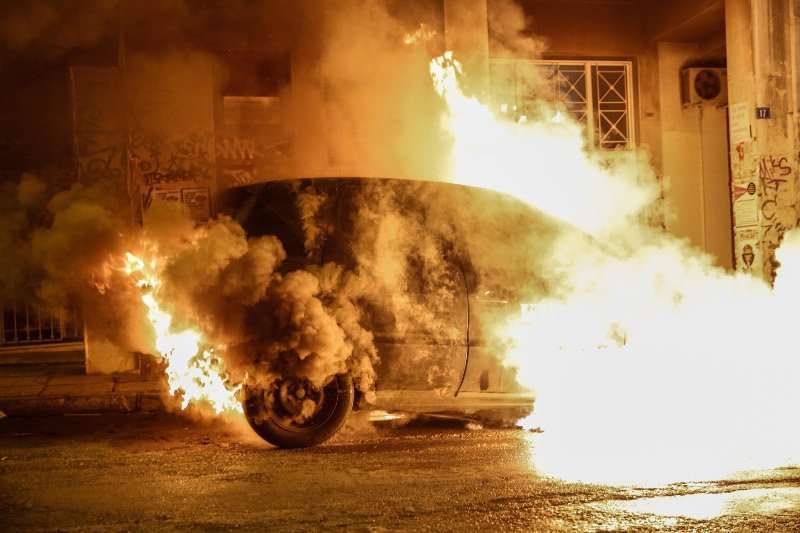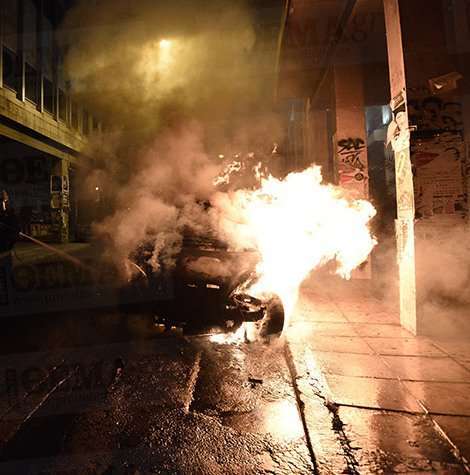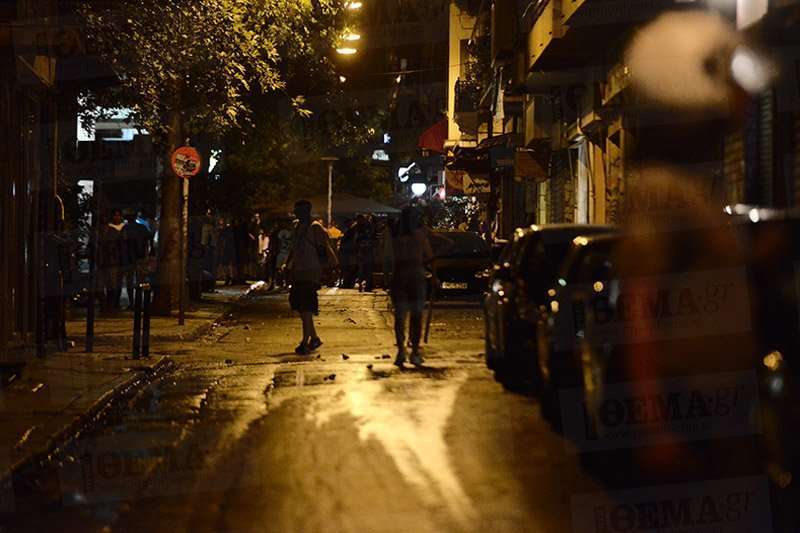Several thousand people marched through downtown Athens last night to protest against the conviction of 29 year old Irianna for “joining a terrorist organisation” without any substantial proof. A few hours after the demonstration MAT riot cops were attacked in the Exarchia district.
Just one day after Ermou Street, one of the main shopping streets in Athens, was attacked during a demonstration demanding the release of Irianna, another demonstration took place in Athens. Several thousand people marched after Irianna has been convicted for “joining a terrorist organisation” without any substantial proof. After yesterdays demonstration a riot squad was attacked in the Exarchia district.
Irianna is a 29-year-old woman, born and bred in a middle class suburb of Athens (Cholargos). She has worked as a teacher and is a PhD student at the University of Athens, as well as being a volunteer teacher to learn Greek to young refugees. She studied Greek Philology, major in Linguistics and she did her masters thesis in teaching Modern Greek as a second or foreign language. While a student she fell in love with Konstantinos, a naval engineering student from National Technical University of Athens (NTUA), who she knew him from her school time years.
In general, Irianna had a pretty “normal” life for an average 29-year-old Greek young woman. Until last Friday — when she ended up in jail serving thirteen years’ for “possession of illegal firearms with intent to distribute them for criminal activities” and for being part of the same terrorist group as her boyfriend had been accused and acquitted.
Her first encounter with the authorities was in 2011 when, during the middle of the night, a SWAT team raided the apartment that her boyfriend was renting — arresting both of them while they were asleep. While she was detained she willingly provided fingerprints and a DNA sample and cooperated all the way with the authorities. In less than 24 hours, she was released again.
Irianna’s boyfriend faced charges for being a member of a urban guerilla group called “Conspiracy of Fire Cells” (CFC), an anarchist group known for several actions. Some of them included letter bombs sent to the IMF offices in Paris, but after a long trial that took a huge psychological and financial toll on him and his family he was unanimously declared innocent with the judges and the prosecutor agreed on his innocence.
During the trial of Irianna’s boyfriend, in 2013 an anti-terrorist squad arrested Irianna in a central avenue of Athens’ northern suburbs. She was taken to the District Attorney, who informed her that she was being charged for being part of the same urban guerilla group as her boyfriend was accused and that her DNA was found on some firearms that Greek police had found one and a half years earlier in the campus of NTUA in Athens. The firearms were never used in any criminal activity and were found by a mystery witnessthat didn’t even show up in court to be cross examined while the anti-terrorist service wasn’t able to locate him. The DA decided to let her go again, this time under some light and loose conditions compared to the type of charges she faced back then. She had to present herself to Police HQ three times per month and she wasn’t allowed to leave the country without permission. Later on, while waiting for trial and with those terms applied, she was allowed by the Board of Judges to attend two international conferences in Spain and Germany with her academic colleagues.
The referral note makes clear that “No element is linking her to the Conspiracy of Fire Cells organization was found from the “lift of privacy on her phone and her bank accounts”. Nor did it show any evidence of involvement or participation in the organization after the search of her house at home or the search for a car registered under her father’s name.” Nevertheless, in its conclusion, the note mentions “serious indications of guilt” without identifying them, sufficient to simply refer to the relationship of Irianna with her partner and not to mention any contact or acquaintance with any other person of those listed in the socalled terrorism category.
Her trial went on for about two years. During that period her boyfriend was found irrevocably innocent. Irianna, on her part, struggled to live a normal life and to make ends meet while recession in Greece was becoming deeper and deeper. While working full time, she concluded her master thesis and she started her PhD. She was lucky enough to have supportive friends and family during her struggle. She sought help from an acclaimed scientist in the field of DNA, Dr. George Fitsialos, a forensic analyst and with huge experience on this field and association with Police authorities in the past. His scientific testimony, even though it was full of concrete evidence was totally disregarded by the judges.
When the scientist asked the authorities for a DNA sample to cross examine it, he received a negative reply with the excuse that the sample was so little that it only sufficed for one test and therefore no second test could be met.
Dr Fitsialos compared the results of the test made by the Greek police and found them extremely insufficient in the degree that in no case whatsoever, a definite outcome could be the result. Irianna’s attorney Mr. Theodoros Mantas compared the situation as if two credit cards had the same first four digits and all the rest were different. Still the judges weren’t impressed.
When it was Irianna’s turn to defend herself she stated in the most emphatic way that not only she is not a member of any terrorist group but that she isn’t even an anarchist. And of course she never had any connections with any type of firearms which was proven in the most scientific way by Dr. Fitsialos’ research. Even though it was made clear by the witnesses that Irianna was never involved in any political action, party or organisation the court thought otherwise. Her friends and people who watched the trial, confirm this as well.
In the Greek penal system officially the duty of the judges is to seek the truth no matter what. For this reason before the judges reach a verdict they officially should take into account not only the evidence but the character, the life of the defendant, and the circumstances under which he or she acted. In Irianna’s case, even though there are undeniable facts that prove her peaceful way of life, her efforts to achieve an academic status, and the struggle to maintain a normal way of life during the trial, the judges ignored all this. They found her guilty.
The most extreme evidence of judicial hardship experienced by those who attended the trial was the refusal by the court to take into consideration the appeal that Irianna had brought to court with this resulting to he immediate imprisonment. The same noon after the trial she ended up in jail. The judges had ignored her appeal, and the huge amount of similar previous cases. It is typical that, for instance, even in cases of corruption with millions of euros and with multi-year sentences involved that appeals are accepted and the defendants are let go until the time when their appeal is revised by the court again.
Usually, for the reader, such stories end with a verdict and in best-case scenario the reader might consider with awe and compassion the extent of the punishment. Irianna’s story doesn’t end with the sound of the judge’s hammer. It carries on through the “hospitality” of prison transfer department to the overpopulated and crisis-hit infrastructures of the Greek penitentiary system.
Irianna’s struggle continues and she still has on her side all those who care for her. Despite the story, with a notion of Greek tragedy the young couple managed to sign a civil partnership agreement the day after the end of the trial — uniting their lives while prison walls are separating them.




